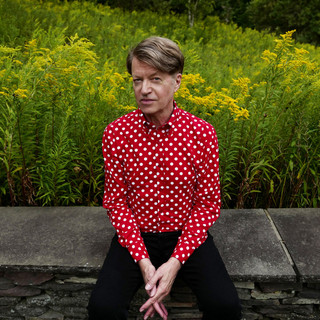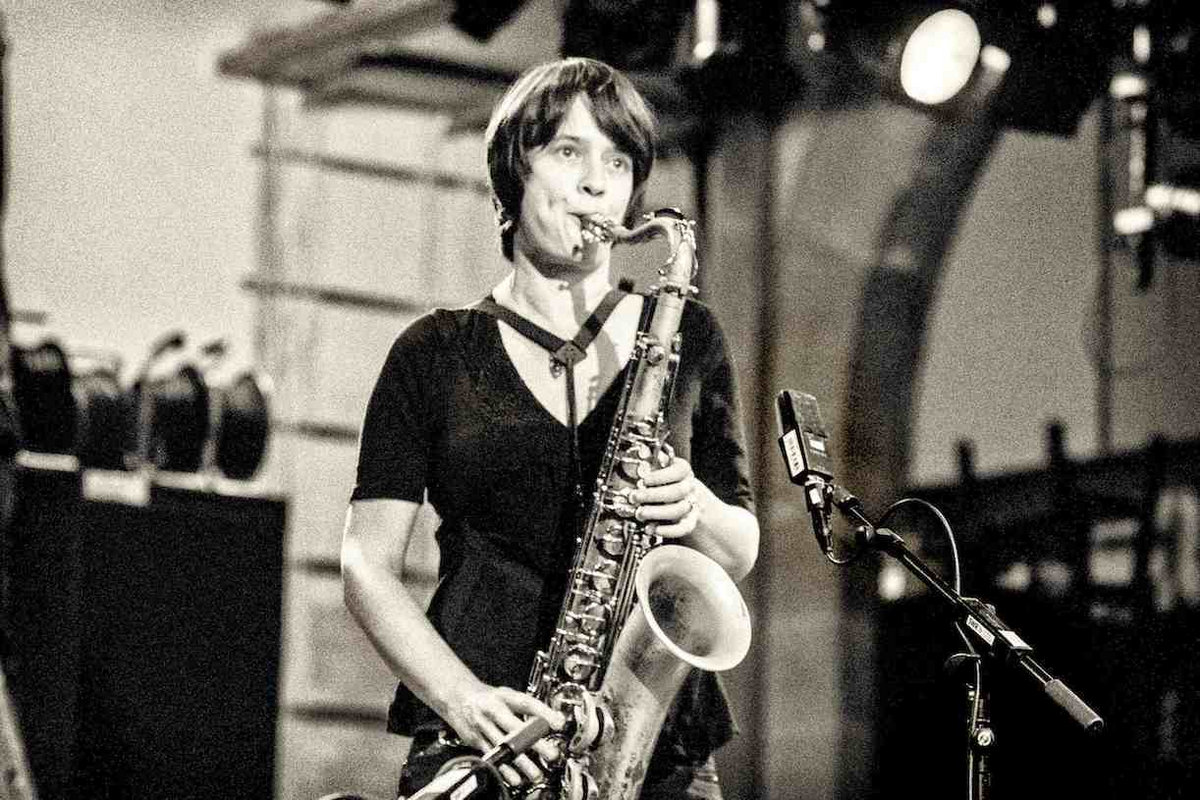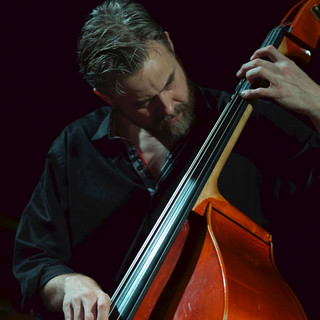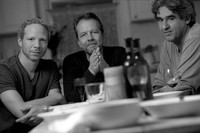Jun
02
with Nels Cline : Consentrik Quartet, Ingrid Laubrock, Chris Lightcap & Tom Rainey
Fri June 2nd, 2023
7:30PM
Main Space
Minimum Age: All Ages
Doors Open: 6:30PM
Show Time: 7:30PM
Event Ticket: $25-$35
Day of Show: $25-$35

Ticketing Policy
Proof of vax is NOT required for this event
Nels Cline

Up until the mid-2000s, guitarist Nels Cline was probably best-known for his work in the group Quartet Music and other projects in the jazz, rock, and avant-garde idioms, as well as for his general involvement in the West Coast’s avant and improv scenes. During the ’90s, Cline recorded a pair of duo outings with Thurston Moore and Devin Sarno before embarking on Interstellar Space Revisited: The Music of John Coltrane with drummer Gregg Bendian ; he joined the latter’s Interzone group while leading his own trio, the Nels Cline Singers. In 2004, Cline opened up a much larger audience for a jazz guitarist than is typical, joining the alt-country and experimental pop act Wilco . Whether playing the music of other jazzmen such as Andrew Hill (2006’s New Monastery: A View Into the Music of Andrew Hill), recording a score to accompany the massive touring retrospective of iconic Los Angeles painter Ed Ruscha (Dirty Baby), collaborating with guitarist Julian Lage , jamming and recording with Medeski, Martin & Wood , or rocking with White Out , Cline is a figure with global influence. In 2016, he issued Lovers, his Blue Note debut, featuring the guitarist leading his own group and a chamber orchestra in a collection of standards and originals. He followed with 2018’s Currents, Constellations and a trio of 2020 albums that included Share the Wealth.
Born in Los Angeles in 1956, Cline began playing guitar around the age of 12, when his twin brother Alex began learning the drums. By the time Cline reached his twenties, he was heavily involved in L.A.’s improvisational community and, in 1978, appeared on his first recording, Openhearted, by multi-instrumentalist Vinny Golia . He went on to appear on over 70 releases, lead several of his own groups — including the Nels Cline Trio and the sextet that followed, Destroy All Nels Cline — and tour internationally with a variety of bands. As a composer, Cline has scored films in addition to writing much of his own material. He has also produced albums for himself, G.E. Stinson , and Jeff Gauthier , among others.
Bassist Eric Von Essen and Cline met up in the late ’70s and began working together, recording an album of duets called Elegies that was released in 1980 on the Nine Winds label. Von Essen got involved in an orchestra with violinist Gauthier , and it wasn’t long before the three formed a group of their own. Alex Cline sat in on their first concert and eventually joined the three permanently, resulting in the group Quartet Music , which remained together throughout the ’80s. In addition to his work in Quartet Music during this decade, Cline worked with Liberation Music Orchestra West Coast, was a member of a rock band called Bloc, worked with Julius Hemphill as well as Charlie Haden , and released his first album as leader, Angelica, which included members of Quartet Music , saxophonist Tim Berne , and more.
The first half of the ’90s found his new Nels Cline Trio hosting a weekly improv series for four years and recording as many albums. During the ’90s, Cline also worked with Thurston Moore (of Sonic Youth ), Stephen Perkins ( Jane’s Addiction ), Mike Watt ( Minutemen ), and the Geraldine Fibbers . A duo recording by Cline and percussionist Gregg Bendian covering John Coltrane ‘s Interstellar Space was released by the Atavistic label in 1999. That same year, the California Music Awards named Cline Outstanding Jazz Artist. The next year, he released Inkling on Cryptogramophone , beginning a collaborative relationship with Andrea Parkins that would continue for the next several years. Destroy All Nels Cline was next, followed by the formation of the Nels Cline Singers, who released their first album, Instrumentals, in 2002.
In 2004, Cline was asked to join Wilco and has toured and appeared on all subsequent albums by them. He still had time for other projects, however: there have been several one-off collaborations during the ensuing years and two albums by the trio of Cline, Andrea Parkins , and Tom Rainey . In 2004, the Nels Cline Singers released Giant Pin, which Cline followed with an album of Andrew Hill compositions in 2006, the sublime New Monastery. Cryptogramophone subsequently issued two more releases by the Nels Cline Singers, Draw Breath in the summer of 2007 and the two-CD package Initiate in 2010. Later in the year, Cline released Dirty Baby, a double-disc collaborative project with poet and producer David Breskin. Breskin selected 66 period images by the artist Ed Ruscha and evenly split them into two groups, wherein he commissioned the guitarist to compose one long work and one short work to accompany the images, without further instruction. Cline recorded these with a large group of musicians including Jon Brion , Scott Amendola , brother Alex Cline , and Devin Hoff . There is also a lushly illustrated book version with larger reproductions of these works with 66 written pieces by Breskin. Add this project to all the work Cline has done as a sideman since the turn of the century, and you’ve got one extremely busy, prolific, and versatile guitarist. In April of 2014, he appeared as a guest on Joan Osborne ‘s Love and Hate album, and as a full collaborator with Medeski, Martin & Wood on Woodstock Sessions 2. In 2014, Macroscope, with the Nels Cline Singers, and Room, a duet offering with classical guitarist Julian Lage , appeared on Detroit’s Mack Avenue Records .
After recording Star Wars with Wilco and a tour, Cline signed to Blue Note . His debut for the label was the double-length Lovers. Realizing a long-held dream, the set was inspired by Bill Evans , Jim Hall , Gil Evans , and Henry Mancini . Cline created an ambitious, self-proclaimed “mood music” project with a 23-member ensemble conducted and arranged by Michael Leonhart . It was produced by David Breskin and recorded and mixed by Ron Saint Germain. Lovers contained jazz and Great American Songbook standards alongside originals and covers of songs by Annette Peacock , Gabor Szabo , Sonic Youth , Jimmy Giuffre , and Arto Lindsay . The single/video “Beautiful Love” was issued in early June of 2016, premiered live at the Newport Jazz Festival in July, and released in August.
Cline’s recording experience with Lage on Room proved indelible. The pair often speculated on what an album would sound like if they chose a rhythm section. To that end, Cline asked bassist Scott Colley and drummer Tom Rainey (who had played hundreds of shows together as a running rhythm section in the ’90s) to accompany them at a residency at New York venue The Stone in 2016. At that time, Colley and Lage were playing in Gary Burton ‘s group and the bassist eventually joined the guitarist’s trio. Cline had played with everybody before. The live gig went so well it laid the foundation for the recording sessions that resulted in Currents, Constellations, Cline’s second Blue Note album, with the intrepid quartet calling itself the Nels Cline 4. He wrote seven of the record’s eight compositions; the lone cover was Carla Bley ‘s “Temporarily,” a rarity closely associated with the Jimmy Giuffre Three. According to Cline, the point wasn’t to feature “sovereign” fewer guitar solos, but to facilitate an ensemble sound, whether marked by heated collective improvisation or a more delicate and precise approach on the contemplative pieces. The funky preview single, “Imperfect 10,” was released in March along with a promotional “in-studio” video. Currents, Constellations was released in mid-April a few days before the band — with bassist Jorge Roeder sitting in for a previously committed Colley — undertook a European tour.
In January of 2020, Cline, bassist William Parker , and keyboardist Thollem McDonas , issued Gowanus Sessions II for ESP-Disk . During the spring, Cline and pianist/organist/synthesist Jamie Saft aided drummer/composer Bobby Previte in the RareNoise trio outing Music from the Early 21st Century. In October, Blue Note Records issued the single “Beam/Spiral” preceding the release of Share the Wealth, Cline’s third label offering, this time by an expanded Nels Cline Singers. Curiously, the lineup he assembled — saxophonist Skerik , percussionist Cyro Baptista , keyboardist Brian Marsella, bassist Trevor Dunn , and drummer Amendola , had yet to play a gig together when they entered Brooklyn studio The Bunker. Cline and co-producer Eli Crews recorded the band over two days, playing long, spontaneous jams. Cline originally wanted to edit the sprawling proceedings heavily, in order to create a cut-and-paste, collaged, psychedelic record. Upon listening closely to the uninterrupted jams, however, he changed his mind and decided to release them unedited. The double-length Share the Wealth was released in November. ~ Sean Westergaard & Thom Jurek, Rovi
Nels Cline : Consentrik Quartet

To be sure, the guitarist and composer Nels Cline has range. Think of how he elevates the songs of Jeff Tweedy as a member of Wilco, or the diverse musical terrain he’s traversed on his albums for Blue Note Records over the past decade — from the gorgeous, sweeping mood music of Lovers to the wide-open sonic audacity of Share the Wealth, the latter featuring his longtime group the Nels Cline Singers.
Now comes Consentrik Quartet, the eponymous debut showcasing a newer band comprising tenor and soprano saxophonist Ingrid Laubrock, bassist Chris Lightcap, and drummer Tom Rainey. By turns swinging, grooving, bracing, mesmeric and quietly stunning, Consentrik Quartet spotlights the ensemble’s profound chemistry as well as Cline’s versatility as both a player and a writer in a focused context where his gifts can be appreciated with absolute clarity.
It also underscores his ceaseless appetite for and encyclopedic knowledge of great improvised music: Committed jazz observers might hear echoes of the sax/guitar frontline attack and programmatic scope of the Joe Lovano/John Scofield quartets, as well as the soft-spoken intensity and seamless blend of composition and improvisation that defined the various iterations of the Jimmy Giuffre 3. In fact, Consentrik Quartet feels at times like a roadmap to Cline’s rich and considered palette of influences — from the new-music hues of “The Returning Angel” and “Allende” to the groove hypnosis of “The 23” and the free-swinging “Surplus,” where Cline punctuates well-drawn post-bop lines with gritty electric-blues phrases.
A double LP that remains compelling from beginning to end, Consentrik Quartet can feel more like a best-of compilation than a new work. To put it a different way, it just might be the finest leader recording of Cline’s long and storied career. And with its deft balance of swing and the avant-garde — check out “The Bag” — it’s also a terrific and meaningful addition to the Blue Note catalog, calling to mind the label’s 1960s classics by Andrew Hill, Eric Dolphy, and others.
Of course Cline, a genial and generous man, can’t help but channel praise toward his empathetic bandmates. Compared to his often-otherworldly Singers, he explains, the Consentrik Quartet is “much more of a jazz group, if I dare use that word. I wanted to have the music reflect the players, and have the players come forth so that everybody is able to hear them and enjoy their lucidity and their mastery.”
To start, “I’ve got one of the greatest drummers on the planet in the band” in Tom Rainey, says Cline. Rainey, probably best known for his work with Tim Berne and Laubrock, his spouse, is that rare avant-gardist who can expertly color and improvise freely, then swing with old-school ferocity. Cline wrote “The Bag” as a dedication to Rainey, whose opening drum solo hits like a master class in the art of drum-kit-as-orchestra. Lightcap has earned acclaim for his original music and his collaborations with Regina Carter, Craig Taborn, Joe Morris, Matt Wilson, and other luminaries, and Cline praises the vast reach of his skills. As heard on the extended solo intro to “Question Marks (The Spot),” he is capable of inspired melodic and narrative playing in the post-Scott LaFaro and Charlie Haden mold, but he also “plays real bass bass,” as Cline puts it. “He has that solid, supportive thing,” he adds. “Deep feel.”
A superb avant-gardist whose music is equally challenging and alluring, Laubrock has left Cline dumbstruck over the years as a co-leader with Rainey and in groups like guitarist Mary Halvorson’s octet. “I heard her negotiating these perplexing chord changes in that band, with this amazing combination of great facility but also a kind of intimacy,” he says. “Honestly, when I listen to her playing on the Consentrik record, I’m consistently blown away. To me, it sounds like it’s her record because of how she shines.” Cline and Laubrock urge each other toward greater heights throughout, sparring and entangling to riveting effect on tracks like “House of Steam.”
Cline wrote one of the album’s most remarkable pieces, “Satomi,” in tribute to Satomi Matsuzaki of the experimental-rock titans Deerhoof. During the pandemic, despite experiencing profound and tragic life changes, Matsuzaki provided a ballast to Cline and his wife, the musician Yuka Honda. “Satomi is an amazing artist,” Cline begins, “but she’s also an incredible friend. She’s the kind of person who is just there for you.”
“The first part of the piece is a reflection of Deerhoof, and more specifically her exuberance and amazing energy,” Cline says. “And the second half is my reflection on the challenges she faced during the pandemic; basically, I’m sending a message to her musically that I care. It’s thoughtful and slightly sad until the very end, where there’s a bit of resolution — a light at the end of the tunnel, or a kind of prayer.” In its melancholy stillness, the album-closing “Time of No Sirens” is similarly affecting.
The pandemic figures heavily into the Consentrik story. Cline first assembled these musicians six years ago, for a free-improvisation set at the Brooklyn outpost of John Zorn’s venue The Stone. Soon after, Cline became aware of a commission and grant opportunity through the renowned Philadelphia arts organization Ars Nova Workshop, to compose new music and tour it in the Eastern U.S. “So I wrote about why I thought this was something I’d want to do, and I got the grant,” Cline says. “And then the pandemic hit.”
Cline estimates he wrote half of this material during lockdown, first in Brooklyn and then in rural upstate New York, where he and his wife relocated. “Suddenly,” Cline recalls, “we were enveloped in silence.” The respite afforded Cline the bandwidth to immerse himself in writing, and to think in a diligent way about what the Consentrik aesthetic could be. “Initially, for myself anyway, my sonic palette, I was looking at a more conservative approach—a little more traditional, I guess you’d say.” But Cline’s imagination, it turns out, is too fertile to be hemmed in by artistic parameters—even if he sets them himself. “Over time, I found myself looping and writing funkier grooving tunes,” he says.
“Consentrik started with me trying to strip it down and hardly use any effects,” he continues. Slowly but surely, however, the pedalboard came into play, and in the end Cline’s tasteful command of electronics serves the group well: “The sound of an overdriven guitar, I realize, just so matches the sound of a tenor saxophone.”
This new release is also, in many ways, a love letter to the Brooklyn improvised-music scene that he became a vital player in well over a decade ago. And though he no longer lives in the borough, his allegiance to the creative musicians Brooklyn nurtures remains steadfast.
“My dream starting in the mid-’70s was to live in New York City and play music there,” Cline reflects. “I didn’t do it until 2009, when I met Yuka, and I thought, ‘Whoa—I guess I’m finally doing this.’ But I was very happy to be a part of this community. And I’m still happy about it.”
Ingrid Laubrock

Ingrid Laubrock is an experimental saxophonist and composer, interested in exploring the borders between musical realms and creating multi-layered, dense and often evocative sound worlds. A prolific composer, Laubrock was named a “true visionary” by pianist and The Kennedy Center’s artistic director Jason Moran, and a “fully committed saxophonist and visionary” by The New Yorker.
Her composition Vogelfrei was nominated “one of the best 25 Classical tracks of 2018” by The New York Times.
Laubrock has performed with Anthony Braxton, Muhal Richard Abrams, Jason Moran, Kris Davis, Nels Cline, Tyshawn Sorey, Mary Halvorson, Myra Melford, Zeena Parkins, Tom Rainey, Tim Berne, Dave Douglas, Wet Ink and many others. Laubrock has composed for ensembles ranging from solo to chamber orchestra.
Awards include Fellowship in Jazz Composition by the Arts Foundation, BBC Jazz Prize for Innovation, SWR German Radio Jazz Prize and German Record Critics Quarterly Award. She won best Rising Star Soprano Saxophonist in the ‘Downbeat Annual Critics Poll in 2015 and best Tenor Saxophonist in 2018.
Ingrid Laubrock has received composing commissions by The Fromm Music Foundation, BBC Glasgow Symphony Orchestra, Bang on a Can, Yarn/Wire, Grossman Ensemble, The Shifting Foundation, The Robert D. Bielecki Foundation, The Jerwood Foundation, American Composers Orchestra, Tricentric Foundation, SWR New Jazz Meeting, Jazzahead, Wet Ink Ensemble, The Jazz Gallery Commissioning Series, NY State Council of the Arts, Wet Ink, John Zorn’s Stone Commissioning Series and the EOS Orchestra.
She is an 2022/23 Artist-in-residence of The Wet Ink Ensemble.
She is a recipient of the 2019 Herb Alpert Ragdale Prize in Music Composition, the 2022 Herb Alpert Ucross Prize in Music Composition and the 2021 Berklee Institute of Gender Justice Women Composers Collection Grant.
Ingrid Laubrock is part-time faculty at Columbia University and The New School. She holds an MFA in Music Composition from Vermont College of Fine Arts.
Chris Lightcap

Chris Lightcap is a bassist and composer with a wide-ranging performing and recording career. He has worked with Regina Carter, Craig Taborn, Marc Ribot, Glen Hansard, Mark Turner, John Medeski, Jason Moran, The Kronos Quartet, Tomasz Stanko, Chris Potter, Paul Motian, John Scofield, Dave Liebman, Jon Irabagon, Paquito D’Rivera, Anthony Braxton, Joe Morris, Joshua Bell, Sheila Jordan, James Carter, Butch Morris, Ben Monder, Mary Halvorson, Julian Lage, Terrel Stafford, Ralph Alessi and many other artists.
Lightcap’s releases as a leader and composer have been featured on year-end top album lists by The New York Times, Rolling Stone, NPR, Downbeat, Jazztimes, the Village Voice and The Wall Street Journal. These include Lay-Up (2000), his debut quartet album on Fresh Sound featuring Tony Malaby, Bill McHenry and Gerald Cleaver, followed up by Bigmouth (2003). This group expanded to a quintet with Craig Taborn and Chris Cheek on Deluxe (2010) and Epicenter (2015) which were released on the Clean Feed Label under the name Chris Lightcap’s Bigmouth. In 2014 Lightcap assembled Superette, an all-electric band featuring Jonathan Goldberger and Curtis Hasselbring on guitars and Dan Rieser on drums. Superette released its debut recording on Royal Potato Family Records in 2018 featuring guests Nels Cline and John Medeski. Finally, Lightcap’s most recent release is SuperBigmouth (2019) on the Pyroclastic label. This album features an octet that combines both the Bigmouth and Superette ensembles. Lightcap has led various groups at major festivals around the world including Earshot, Willisau, Saalfelden, North Sea, Porto, Geneva, Ljubljana, Maribor, Edinburgh and Guimaraes.
He currently performs with a variety of groups, including Regina Carter’s touring and recording ensembles, the Matt Wilson Quartet, Nels Cline’s Consentrik Quartet, the Jon Irabagon Quartet, Craig Taborn’s Daylight Ghosts and the Ghost Train Orchestra.
In 2011 and 2016 Lightcap was awarded Chamber Music America’s “New Jazz Works” commission grants. He has also received generous composing and production grants from The Shifting Foundation. In 2006 Lightcap was commissioned to write “Wiretap” for the contemporary chamber ensemble counter)induction and he has also contributed compositions and arrangements to albums released by Regina Carter, Matt Wilson, Chad Taylor, Mary Halvorson, Rob Brown and others.
Tom Rainey

Tom Rainey was born in Pasadena, California in 1957. Since moving to New York in 1979 he has performed and or recorded with the following artists:
John Abercrombie, Mose Allison, Julian Arguelles, Ray Anderson, Tim Berne, Jane Ira Bloom, Anthony Braxton, Nels Cline, Ted Curson, Kris Davis, Mark Ducret, Mark Feldman, Michael Formanek, Drew Gress, Mark Helias, Fred Hersch, Andy Laster, Ingrid Laubrock, David Liebman, Joe Lovano, Tony Malaby, Albert Mangelsdorff, Carmen McRae, Mike Nock, Simon Nabatov, New and Used, Anita O’Day, Andrea Parkins, Herb Robertson, Angelica Sanchez, Louis Sclavis, Brad Shepik, Ken Werner, Denny Zeitlin.
Current activities include performing and recording music with the Tom Rainey Trio as well as his quintet, Obbligato. Tom also continues performing with many of the aforementioned artists.

